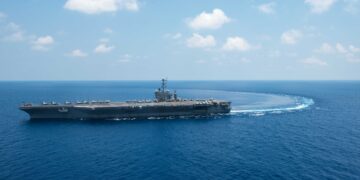
America is willing to sacrifice for uninhabited rocks and reefs in the East and South China Seas. This is one of the main messages from Japanese prime minister Kishida Fumio and Philippines president Ferdinand Marcos’ official visits to the United States. The Biden administration’s doubling down on advancing Indo-Pacific countries’ interests vis-à-vis China represents a reckless strategy in a region where Washington should be especially shrewd and savvy. Instead of fighting others’ battles and setting itself up to fail, Washington should adopt a restrained regional policy to secure its interests.
Primarily, the United States has no vital interest in the outcome of the Senkaku/Diaoyu Islands or the South China Sea territorial disputes. The islands, rocks, and shoals in question are unpopulated, small, and hold little strategic value. Military outposts on these disputed territories are highly susceptible to attacks, face resupply nightmares, and inherent environmental issues—making any existing or potential Chinese bases more distractions than threats. Additionally, while freedom of navigation in the East and South China Seas is a legitimate concern, Beijing is highly unlikely to halt commerce since it is the prime beneficiary. Not to mention, trade can be rerouted at monetary cost. No lives need to be sacrificed or the world destroyed for mildly cheaper goods.
President Joe Biden’s insistence on U.S. defense treaties with Japan and the Philippines covering the Senkaku/Diaoyu Islands and the Philippines’s military activity in the South China Sea increases tensions and risks conflict with China. Beijing views the two disputes as “core” or vital interests. As such, China is willing to risk war to assert its claim if necessary. Indeed, Beijing became more assertive after Washington announced its “Pivot to Asia,” out of fear it could effectively lose its territorial claims. China’s assertiveness will not disappear with stronger U.S.-Japan-Philippines ties but will likely intensify to test the relationship and attempt to deter it.
Moreover, the “ironclad” security guarantees for Japan and the Philippines’ disputed territory encourage risky behavior. While Japan has been relatively restrained in the East China Sea, its 2012 nationalization of the Senkaku/Diaoyu Islands intensified the dispute with China. Denationalizing the islands and regulating their ownership, which could cool tensions, are likely off the table so long as Washington fully underwrites Japan’s claims.
More on Asia

Featuring Lyle Goldstein
November 14, 2025

Featuring Jennifer Kavanagh
November 5, 2025

Featuring Lyle Goldstein
November 4, 2025






